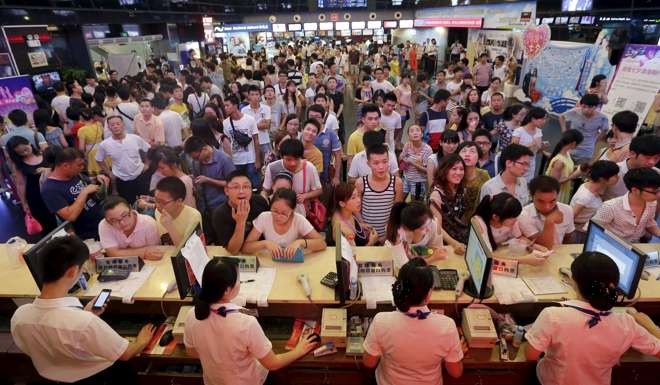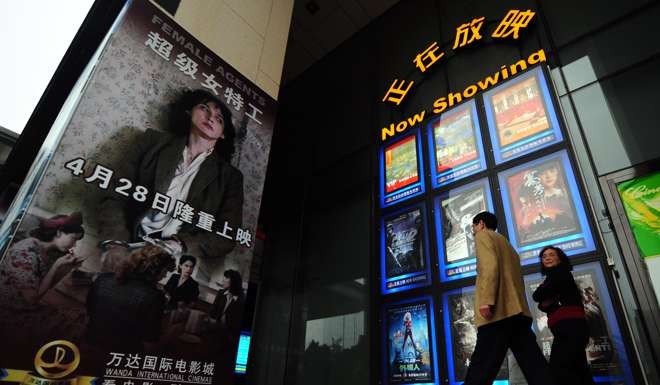
Analysis | Chinese box office hits the buffers
After years of double-digit growth, the domestic film industry is struggling. But the big guns are still investing, and now have Hollywood firmly in their sights
China’s cinema industry had a gloomy “golden week” – the annual Chinese holiday which was expected to defy a broader narrative of lacklustre national consumer spending.
Not one of the 17 new releases over the period – three more than last year – rivalled box office takings of golden week 2015’s top-grossing films. In total, they pulled in US$234 million, a huge 15 per cent annual slump in takings, and the first slide in over a decade.
The poor holiday takings came on top of a weak half year too. None of the 152 Chinese releases over the summer – six more than last year – rivalled box office takings of last year’s top-grossing films, pulling in US$1.58 billion, also down 15 per cent from a year earlier, the first slide in over five years.
It is still too early to sound the death knell for the industry, according to analysts. But it was certainly a sharp jolt for China’s previously booming movie-going sector, which had been enjoying over 30 per cent annual growth in box office in recent years, building it into the world’s second largest after the United States, according to market researcher EntGroup.
That momentum reached its zenith in 2015, with an astonishing 48 per cent surge in ticket sales, which led to predictions that China was on track to overtake the US market in size this year.
Market watchers have now scaled back their expectations, dramatically.
Nomura analyst Richard Huang is projecting 5-10 per cent annual growth in box office receipts, from 25 per cent earlier.
China’s richest man Wang Jianlin, who owns the country’s largest filmmaker and cinema chain Wanda Cinemas, has predicted this year’s takings in China to hit US$7-8 billion, a growth he described in a speech last week as “relatively slow”.
Last year’s dramatic uptick was largely fuelled by a price war among major online ticketing platforms backed by tech behemoths such as Tencent and Alibaba, who offered generous subsidies to consumers as they tried to gain their foothold. Alibaba owns the South China Morning Post.
The deep discounts, which made it as cheap as US$1 to watch a blockbuster, drew new segments of Chinese society to film theatres.
But numbers have fallen quickly since the special offers have been gradually phased out this year, following industry consolidation.
“We estimate they have removed 70 per cent of the subsidies since April, which has discouraged potential moviegoers.”said Huang.

Wang’s Dalian Wanda Group and other rivals have been in a rush to build cinemas nationwide, as personal income levels continue to rise, making movie-going a much more affordable form of high-quality entertainment, particularly in increasingly affluent mid- and lower-tier cities.
Last year, an average 22 new theatre screens were added in China every day, versus a daily rate of three in 2012, official data showed.
By the end of 2015 there were 31,627 screens nationally, 40 per cent more than a year earlier.
Filmmakers including Alibaba Pictures also acquired major stakes in top operators including Dadi Cinema Construction, the country’s second largest after Wanda Cinemas.
The unprecedented buying binge of film infrastructure, followed by sluggish box office growth this year, have already heightened concerns that far too much hot money has been ploughed into movie-related entities.
Over the last year or two, people have been too rash in making financial investments in the sector
“Over the last year or two, people have been too rash in making financial investments in the sector,” said Liu Cuiping, research director with Ent Group.
According to industry database Wind Information Co, there were a record 125 mergers and acquisitions in China’s movie and entertainment industry last year.
Fuelled by ample available capital, the number of Chinese domestic releases last year touched a three-year high at 686, just marginally below the 702 releases in the US for the same period.
But while investment skyrocketed, “the quality of Chinese films failed to keep pace”, said Ray Zhao, an analyst at Guotai Junan Securities.
“It usually takes two to three years to produce a good film, but now many Chinese studios are too impatient, pumping out works with shoddy special effects and boring storylines within a very short time frame.”
One example, adds Zhao, is LORD: Legend of Ravaging Dynasties, a big-budget disappointment launched over golden week, directed by China’s richest writer Guo Jingming.
The animated fantasy, starring the country’s best-earning actress Fan Bingbing and former EXO member Kris Wu, flopped with earnings falling sharply after opening day, as poor reviews spread like wildfire across social media.
It netted only US$53.6 million in China, although many had anticipated it to smash box-office records as Guo’s debut film Tiny Times had done three years ago.
“All the characters looked similar, dressed similar, and played similar roles,” blasted popular film critic Luo Jin.
“The plot is also under-whelmingly crude and hard to follow.”

Also feeling the pressure is China’s tech giant LeEco, whose Le Vision Pictures poured an estimated US$22.2 million into the film.
Analysts expect it to barely break even at best on its investment, based on a general rule that for a film to turn a profit, it needs to earn two to four times its production budget in box office receipts.
The Shenzhen-listed firm had pledged to rack up a net profit of US$76.9 million this year, Zhao said, but its chances of hitting that target now appear slim.
Analysts argue Chinese filmmakers have also been putting too much focus on producing teen romance films in recent years, generally easier to generate big box office receipts on a small budget – but only if they feature good-looking young actors will huge fan bases.
“As an industry it is somehow paralysed at the moment,” said Huang Guofeng, a Beijing-based media and technology analyst with consultancy Analysys.
It usually takes two to three years to produce a good film, but now many Chinese studios are too impatient, pumping out works with shoddy special effects and boring storylines within a very short time frame
“We need diversification, for instance more science fiction movies need to be added to the mix.”
Since the success of Guo’s Tiny Times, a story about college girls struggling for love and friendship, and Taiwan romance You Are the Apple of My Eye, the past three years have seen precious little other than love stories of teenagers, and people in their early 20s.
Some turned out to be big hits – So Young, for instance, directed by Chinese actress Zhao Wei in 2013. and its recent sequel So Young 2:Never Gone – but most have been panned for duplicated narratives and shallow scripts.
Lousy reviews, however, did not defy Beijing Enlight Media, the country’s second biggest private-sector film producer, from sticking to its own “teen romance” strategy.
Chief executive Wang Changtian recently insisted “young people’s fixation on this genre” would not lead to empty seats.
But the numbers are already starting to show moviegoers are turning their backs on the now-tired-looking formula.
One young film goer, Tan Yanran – a huge fan of 20-year-old actress Crystal Liu, who boasts 50 million fans on social media platform Sina Weibo – had not missed one of her idol’s films. But like many thousands of others, she didn’t bother with Never Gone 2, despite Liu playing a leading role.
“I have seen quite enough of these kinds of films. My interest has waned. I didn’t see it, but I certainly could have told you the story,”the university student told SCMP.
So Young 2 notched up US$49.9 million this summer, less than a half of the original So Young. It garnered a less than 30 per cent rating on top review website Douban.
“Great content, as well as big stars, should be at the heart of any successful film,” says Nomura’s Huang. “But some studios are too heavily focused on short-term financial returns.”
Instead of actually taking over from Hollywood, Guotai Junan’s Zhao now reckons it could take 20 years for China’s film industry to get anywhere near its US role model.
Hollywood releases still score better than any domestic ones, despite a strict control put on the number of foreign releases in China by the film authorities, to help local production firms.
The 18 imported titles allowed so far this year, which made up less than a fifth of all summer releases this year, contributed 48 per cent of combined box office takings, according to official data.
“In this winner-takes-all landscape, it makes sense for companies like Wanda and Alibaba to team up with Hollywood studios, to learn from the best,” notes Analysys Huang.
Wanda, looking to shape a global entertainment empire rivalling Disney, has sealed a film production tie-up with Sony Pictures after it bought Hollywood studio Legendary Entertainment for $3.5 billion.
While earlier this month, Alibaba announced it was partnering with top-grossing director Steven Spielberg, in a deal that will aid Spielberg’s Amblin Pictures in financing, producing and distributing films.

Smaller players including gaming-to-entertainment giant Perfect World and Huayi Brothers Media have also stuck deals with US filmmakers Universal Pictures and STX Entertainment for cooperation.
“All of them want to be first movers,” said Analysys’ Huang.
As well as setting their sights on Hollywood, China’s film industry titans are also stepping up their efforts to snap up e-commerce platforms and merchandising rights, a prime example being Wanda’s US$350 million acquisition of film news and ticketing portal, Mtime.com.
But even its rash of recent deals have failed to ignite the shareprice of Wanda’s film offshoot Wanda Cinemas, which have fallen 45 per cent this year.
Amid the growing market jitters, Huayi Brothers’ shares have also dropped 40 per cent, and Enlight has shed 29 per cent of its value in Shenzhen year to date.
China Merchant analyst Angela Han recently downgraded Imax China, the country’s largest widescreen theatre provider which counts Wanda as its biggest client, to “Neutral”, on expectations that this year’s underwhelming box office would weigh heavy on its shares.
“But interestingly, despite all the doom and gloom, most filmmakers have not slowed their rate of production output,” said Analysys’ Huang.
Industry insiders believe China’s movie market still has abundant room for expansion as household incomes continue rising, and it is still significantly “under-penetrated” compared with the US and South Korea.
An average Chinese individual pays 1.4 visits to the movies annually, data from the National Bureau of Statistics showed, while the equivalent in the US and Canada was 3.7 in 2014.
“There is 200 to 300 per cent growth potential,” insists Nomura’s Huang.
“This year has been a disaster, but next year we have high hopes on good titles like Fast and Furious, Transformers and The Mummy”, he added – all US productions.
He added too that as ties with Hollywood studios deepen, the quality of domestic films will also improve.
Huayi’s chief executive Wang Zhonglei said in a recent press statement that it was too early to call this year’s stagnation a lingering trend, though he did conceded it was “dragging the company down”.
“Demand is still strong on the back of China’s growing middle classes, while the headwinds should let the market to be more rational and realistic,” said Li Ruigang, a Chinese media tycoon and chairman of Hong Kong-based Shaw Brothers studio in a recent interview.
In his latest public appearance in Hollywood, Wanda’s Wang was also nothing but positive on the sector, reiterating that China’s box office would match North America’s within two years, and be ballooning at an annual rate of 15 per cent over the coming decade.
“Based on this projection,” he said, “by 2026 China’s box office will reach US$30 billion, accounting for 40-50 per cent of the global market share.”

